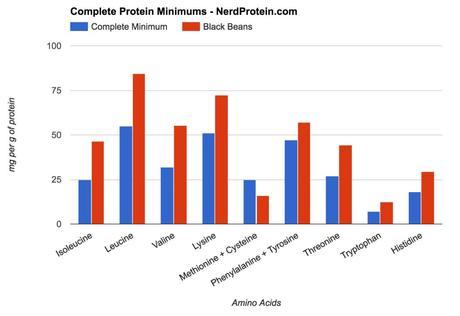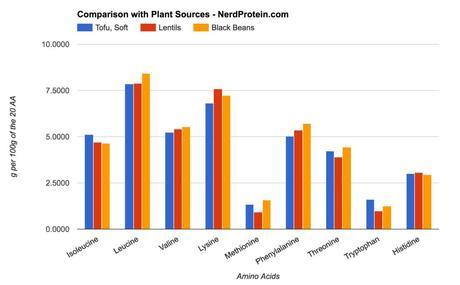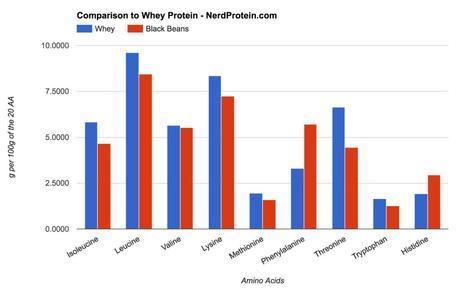Black beans are definitely a source of protein that should be on your radar. They’re fairly high in protein relative to calories and they’ve been cited by many authors as a great tool for fat loss. In particular, Tim Ferris identified them as one of the foods that led to the fastest weight loss.
That said, the protein is largely complete. The methionine+cysteine content is slightly below the complete minimum but that should only deter you when eating near minimal amounts of protein.
Is Black Bean Protein Complete?
No. However, it nearly is complete. The methionine + cysteine combined value is a little under. I’ve noticed that people obsess about the complete/incomplete label. You would be hard pressed to find a food source in nature that had absolutely none of one of the essential amino acids.

Black Bean Protein Density
The density of protein relative to calories is quite good actually when compared to foods like brown rice or quinoa that people so often use. We express that density not as grams of protein per calorie but as the reciprocal. So we’re looking at the caloric cost to get one gram of protein.
For black beans that number is 14.9 Calories/gram of protein. That is to say you would have to eat 14.9 calories worth of black beans before you’ve taken in 1g of protein. Lentils do slightly better at 12.86 Calories per gram.
Source Density (Calories per g of protein)
Pure Protein 4.00
Pacific Cod 4.54
Egg Whites 4.77
Turkey Breast 4.88
Alaskan Halibut 5.11
Chicken Breast 5.32
Whey 4.40
Tofu, Soft 8.51
Lentils 12.86
Black Beans 14.90
Pinto Beans 15.87
Quinoa 27.27
Brown Rice 48.28
Other Nutrients and Minerals in Black Beans
The values below are for 100g of cooked black beans.
Beans usually are a great source of B vitamins and minerals. Black beans are no exception to this general rule. Folate is particularly high. Magnesium is also fairly high. Given the popularity of magnesium supplementation it’s worth noting opportunities to obtain magnesium through your diet.
%DV
Manganese 22%
Magnesium 17%
Vitamin B1/Thiamin 16%
Phosphorus 14%
Iron 12%
Potassium 10%
Copper 10%
Comparison with Lentils and Soy Protein
The first thing you should notice is that the leucine content in black beans is higher than lentils and soy protein. If you’re unfamiliar with the relationship between leucine intake and protein synthesis in the body search for “leucine threshold” or look for a talk by Donald Layman on protein intake.
The other values are fairly unremarkable. Methionine is higher than what you’ll find in lentils. Something to consider beyond the superior protein density of lentils already mentioned.

Comparison with Whey Protein
Our next benchmark protein is whey. It’s one of the highest sources of leucine around and the graph below should give you an good idea just how high the leucine content of black beans is, relative to the “top”.

Conclusion
B vitamins, minerals, high protein relative to calories… what more could you ask for?
One quick tip before I leave you. If you can’t stand soaking beans prior to cooking, look for black beans that have been presoaked and canned. They can be found virtually everywhere.
If you really want to be lazy, try looking for black bean chili. Just make sure they don’t list sugar on the ingredient list.
Even too lazy for that? Just drop by a chipotle and ask for black beans on whatever you order.
—
Leave a comment below. I do actually read them.
